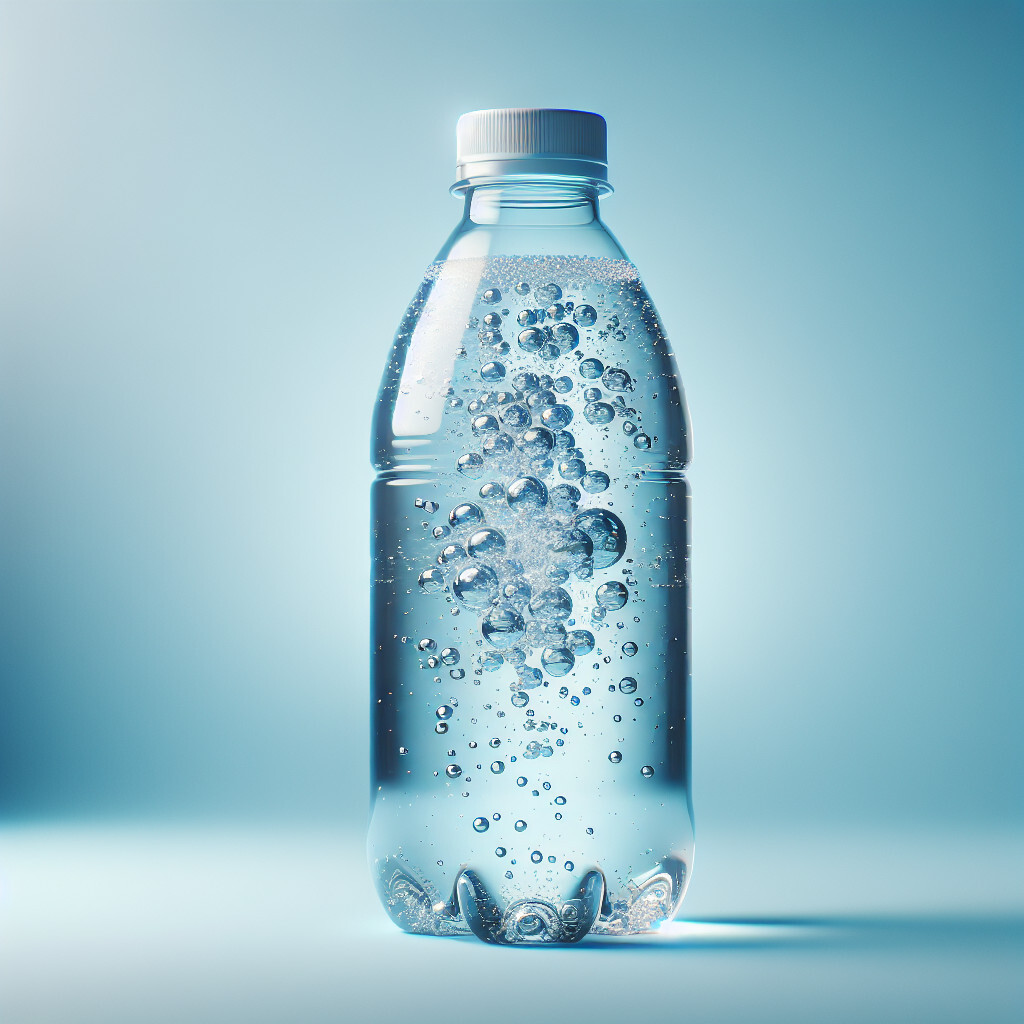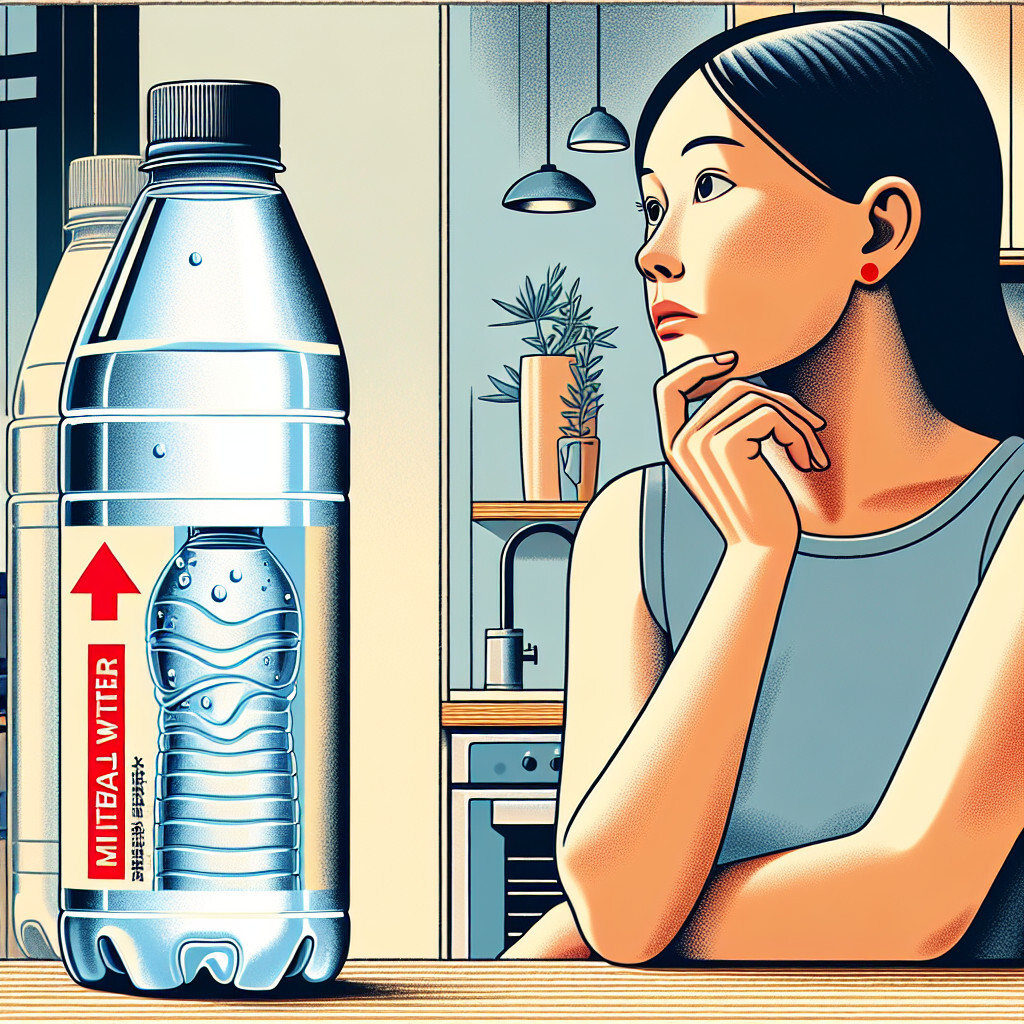-
Table of Contents
- Introduction
- Understanding the Safety of Drinking Mineral Water from Plastic Bottles
- The Impact of Plastic Bottles on Mineral Water Quality
- Health Risks Associated with Consuming Mineral Water from Plastic Bottles
- The Truth about BPA in Plastic Bottles and Mineral Water Safety
- Eco-friendly Alternatives to Plastic Bottles for Mineral Water Consumption
- Q&A
- Conclusion
“Quenching Thirst Safely: The Assurance of Drinking Mineral Water from Plastic Bottles.”
Introduction
Mineral water from plastic bottles is a common beverage choice worldwide due to its convenience and perceived purity. However, the safety of consuming this water has been a topic of debate. The primary concern is not about the mineral water itself, but the plastic bottles it is stored in. These bottles are often made from materials like polyethylene terephthalate (PET), which can potentially leach harmful chemicals into the water, especially when exposed to heat or stored for a long period. These chemicals may have adverse effects on human health. Therefore, while drinking mineral water from plastic bottles is generally considered safe under proper storage conditions, there are potential risks that consumers should be aware of.
Understanding the Safety of Drinking Mineral Water from Plastic Bottles

Understanding the safety of drinking mineral water from plastic bottles is a topic of interest for many health-conscious individuals. The convenience of grabbing a bottle of water on the go is undeniable, but is it safe? The answer to this question is not as straightforward as one might think, as it depends on various factors such as the type of plastic used, the conditions under which the bottle is stored, and the duration of storage.
Plastic bottles used for packaging mineral water are typically made from polyethylene terephthalate (PET), a type of plastic that is lightweight, clear, and strong. PET is approved by health authorities worldwide, including the Food and Drug Administration (FDA) in the United States, for use in food and beverage packaging. This approval is based on extensive testing and research, which indicates that PET is safe for storing food and beverages, including mineral water.
However, it’s important to note that while PET itself is safe, it can potentially leach harmful substances into the water under certain conditions. One such substance is antimony, a trace element used in the production of PET. Studies have shown that antimony levels in bottled water can increase over time, especially when the bottles are exposed to high temperatures. However, even at the highest levels reported, the concentration of antimony in bottled water is well below the safety limit set by the World Health Organization.
Another concern with plastic bottles is the potential for leaching of bisphenol A (BPA), a chemical used in the production of certain types of plastic. BPA has been linked to a variety of health problems, including hormonal disruption and increased risk of certain cancers. However, it’s important to note that BPA is not used in the production of PET bottles. Therefore, if your bottle of mineral water is made from PET, it should not contain any BPA.
Despite these potential risks, it’s important to put them into perspective. The levels of potentially harmful substances that can leach from plastic bottles into mineral water are generally very low and unlikely to cause health problems under normal use. However, to minimize any potential risk, it’s a good idea to store bottled water in a cool, dry place and to consume it within a reasonable time frame.
In conclusion, while there are some potential concerns with drinking mineral water from plastic bottles, the overall risk appears to be low, especially if the bottles are stored properly and the water is consumed within a reasonable time. However, if you’re still concerned about the safety of drinking from plastic bottles, you might consider alternatives such as glass bottles or stainless steel containers, which do not have the same potential for leaching of harmful substances. As always, it’s important to stay informed and make choices that align with your personal health goals and values.
The Impact of Plastic Bottles on Mineral Water Quality
Mineral water, a popular choice for hydration, is often consumed from plastic bottles. However, the safety of drinking mineral water from plastic bottles has been a topic of concern for many. The impact of plastic bottles on the quality of mineral water is a complex issue that involves various factors such as the type of plastic used, the storage conditions, and the duration of storage.
Plastic bottles are typically made from polyethylene terephthalate (PET), a type of plastic that is lightweight, durable, and resistant to impact. PET is generally considered safe for food and beverage storage. However, research has shown that under certain conditions, PET bottles can leach chemicals into the water they contain. These chemicals include antimony, a heavy metal that can cause health problems when consumed in large amounts, and phthalates, which are endocrine disruptors.
The leaching of chemicals from plastic bottles into mineral water is influenced by several factors. One of these is the temperature at which the bottles are stored. High temperatures can increase the rate of chemical leaching. Therefore, it is advisable to store plastic bottles of mineral water in a cool place, away from direct sunlight. Another factor is the duration of storage. Over time, the chemicals in the plastic can migrate into the water. This is why it is recommended to consume bottled water within a certain period after it has been packaged.
Despite these concerns, it is important to note that the levels of chemicals that leach into mineral water from plastic bottles are typically very low. In most cases, they are well below the safety limits set by regulatory authorities. Therefore, the occasional consumption of mineral water from plastic bottles is unlikely to pose a significant health risk. However, for those who consume bottled water regularly, it may be worth considering alternatives such as glass bottles or stainless steel containers.
Moreover, the impact of plastic bottles on mineral water quality is not just a health issue. It is also an environmental concern. The production of plastic bottles requires a significant amount of energy and resources, and their disposal contributes to pollution and waste. In contrast, glass bottles and stainless steel containers are more sustainable options. They can be reused many times, reducing their environmental impact.
In conclusion, while it is generally safe to drink mineral water from plastic bottles, there are potential health and environmental concerns to consider. The leaching of chemicals from the plastic into the water can be minimized by storing the bottles in a cool place and consuming the water within a short period. However, for regular consumers of bottled water, switching to more sustainable alternatives such as glass bottles or stainless steel containers may be a wise choice. This not only reduces the potential health risks associated with plastic but also contributes to environmental sustainability.
Health Risks Associated with Consuming Mineral Water from Plastic Bottles
Mineral water, a popular choice for hydration, is often consumed from plastic bottles. However, the safety of drinking mineral water from plastic bottles has been a topic of concern for many health-conscious individuals. This concern primarily stems from the potential health risks associated with the chemicals found in plastic bottles, which can leach into the water and be ingested by the consumer.
One of the most common chemicals found in plastic bottles is Bisphenol A (BPA), a synthetic compound that has been linked to a variety of health issues. BPA is an endocrine disruptor, meaning it can interfere with the body’s hormonal system. Studies have suggested that exposure to BPA can lead to reproductive disorders, heart disease, type 2 diabetes, and certain types of cancer. Although many manufacturers have started producing BPA-free bottles, other potentially harmful chemicals, such as phthalates, are still commonly used in plastic production.
Phthalates, like BPA, are endocrine disruptors and have been linked to a range of health problems, including hormonal imbalances, reproductive issues, and developmental problems in children. Furthermore, when plastic bottles are exposed to heat or sunlight, the rate at which these chemicals leach into the water can increase significantly. This means that a plastic bottle of mineral water left in a hot car, for example, could potentially contain higher levels of these harmful chemicals.
In addition to the potential health risks associated with the chemicals in plastic, there is also the issue of microplastics. Microplastics are tiny particles of plastic that can shed from the bottle into the water. A study published in the journal Environmental Science & Technology found that plastic bottles are a major source of microplastic contamination in bottled water. The health effects of ingesting microplastics are still not fully understood, but preliminary research suggests they could pose a risk to human health.
Despite these concerns, it’s important to note that regulatory bodies such as the Food and Drug Administration (FDA) in the United States, maintain that the levels of chemicals found in plastic bottles are within safe limits for human consumption. However, these safety limits are based on average consumption and do not take into account individuals who may consume larger quantities of bottled water, or those with heightened sensitivity to these chemicals.
So, is it safe to drink mineral water from plastic bottles? The answer is not straightforward. While the risk associated with occasional consumption is likely minimal, frequent consumption of water from plastic bottles may increase exposure to potentially harmful chemicals and microplastics.
For those concerned about the potential health risks, there are alternatives to consider. Glass bottles, for instance, do not contain harmful chemicals and are not associated with microplastic contamination. Stainless steel bottles are another safe alternative, as they are also free from harmful chemicals and are highly durable.
In conclusion, while drinking mineral water from plastic bottles is not necessarily unsafe, there are potential health risks to consider, particularly for those who consume bottled water frequently. As with many health-related decisions, it’s important to weigh the potential risks against the benefits and make an informed choice that best suits your individual needs and circumstances.
The Truth about BPA in Plastic Bottles and Mineral Water Safety
The safety of drinking mineral water from plastic bottles has been a topic of concern for many health-conscious individuals. This concern primarily stems from the potential presence of Bisphenol A (BPA), a chemical often used in the production of plastic products. BPA has been linked to a variety of health issues, including hormonal disruptions, heart disease, and even certain types of cancer. As such, it’s crucial to understand the truth about BPA in plastic bottles and mineral water safety.
Plastic bottles are a common packaging choice for mineral water due to their lightweight, durable, and cost-effective nature. However, the potential leaching of BPA from the plastic into the water has raised safety concerns. BPA can mimic the structure and function of the hormone estrogen, leading to potential health risks. When plastic bottles are exposed to heat or left in the sun, the risk of BPA leaching increases significantly.
However, it’s important to note that not all plastic bottles contain BPA. Many manufacturers have started using BPA-free plastics in response to consumer concerns. These bottles are typically marked with a BPA-free label. However, some studies suggest that even BPA-free plastics may release other potentially harmful substances, especially when exposed to heat or sunlight.
The safety of drinking mineral water from plastic bottles also depends on the quality of the water itself. Mineral water is often sourced from underground reservoirs and contains essential minerals like calcium, magnesium, and potassium. These minerals are beneficial for health, but the water must be properly treated and tested to ensure it’s free from harmful contaminants.
In addition, the storage and handling of plastic bottles can impact the safety of the mineral water they contain. For instance, reusing single-use plastic bottles can lead to bacterial contamination. Moreover, storing plastic bottles in hot environments can increase the risk of chemical leaching.
So, is it safe to drink mineral water from plastic bottles? The answer is not straightforward. While BPA and other potential contaminants are a concern, many factors influence the overall safety, including the type of plastic used, the quality of the water, and how the bottles are stored and handled.
To minimize potential risks, it’s advisable to look for mineral water packaged in BPA-free bottles. Avoid reusing single-use plastic bottles and store them in a cool, dry place away from direct sunlight. It’s also a good idea to consume the water within a reasonable timeframe after opening the bottle.
In conclusion, while there are potential risks associated with drinking mineral water from plastic bottles, these can be mitigated with proper precautions. The key is to be informed about the potential issues and make choices that prioritize your health and safety. As consumers, we have the power to influence industry practices by choosing products that are not only safe for us but also for the environment.
Eco-friendly Alternatives to Plastic Bottles for Mineral Water Consumption
Mineral water, a popular choice for hydration, is often consumed from plastic bottles. However, the safety of drinking mineral water from plastic bottles has become a topic of concern in recent years. This concern stems from the potential health risks associated with the chemicals found in plastic bottles, as well as the environmental impact of plastic waste.
Plastic bottles are typically made from polyethylene terephthalate (PET), a type of plastic that is lightweight, durable, and resistant to impact. However, PET bottles can leach harmful chemicals into the water they contain, especially when exposed to heat or sunlight. One such chemical is antimony, a toxic metalloid that can cause nausea, diarrhea, and stomach ulcers in high doses. Another chemical of concern is bisphenol A (BPA), an endocrine disruptor that can interfere with the body’s hormonal system and has been linked to a variety of health problems, including heart disease, diabetes, and reproductive disorders.
Moreover, the environmental impact of plastic bottles is significant. It is estimated that a single plastic bottle takes up to 450 years to decompose in a landfill. Furthermore, only a small fraction of plastic bottles are recycled, with the majority ending up in landfills or the ocean, where they pose a threat to wildlife and ecosystems.
Given these concerns, it is worth considering eco-friendly alternatives to plastic bottles for mineral water consumption. One such alternative is glass bottles. Glass is a natural material that does not leach harmful chemicals into the water it contains. It is also fully recyclable, making it a more sustainable choice than plastic. However, glass bottles are heavier and more fragile than plastic bottles, which can make them less convenient to use.
Another alternative is stainless steel bottles. Like glass, stainless steel does not leach harmful chemicals into the water it contains. Stainless steel bottles are also durable and lightweight, making them a practical choice for everyday use. However, they can be more expensive than plastic or glass bottles, and they can give the water a slight metallic taste.
A third alternative is to use a water filter and drink tap water. This option eliminates the need for single-use bottles altogether, making it the most eco-friendly choice. However, the quality of tap water can vary greatly depending on the location, and some people may not like the taste of filtered tap water.
In conclusion, while it is generally safe to drink mineral water from plastic bottles, there are potential health risks and environmental impacts to consider. Eco-friendly alternatives to plastic bottles, such as glass bottles, stainless steel bottles, and water filters, offer safer and more sustainable options for mineral water consumption. However, each alternative has its own pros and cons, and the best choice will depend on individual preferences and circumstances. Therefore, it is important to make an informed decision based on a thorough understanding of the issues at hand.
Q&A
1. Question: Can harmful chemicals leach into mineral water from plastic bottles?
Answer: Yes, certain types of plastic bottles can leach chemicals like BPA into the water, especially when exposed to heat or sunlight.
2. Question: Is it safe to drink mineral water from plastic bottles that have been left in a hot car?
Answer: No, it is not recommended as heat can cause plastics to leach chemicals into the water.
3. Question: Does the type of plastic used in the bottle affect the safety of drinking mineral water from it?
Answer: Yes, bottles made from PET are generally safe for single use, while those made from polycarbonate could potentially leach BPA.
4. Question: Is it safe to reuse plastic mineral water bottles?
Answer: It’s not recommended to reuse single-use plastic bottles as they can harbor bacteria and may leach chemicals with repeated use.
5. Question: Are there any health risks associated with drinking mineral water from plastic bottles?
Answer: Potential risks include exposure to harmful chemicals like BPA, which has been linked to various health issues including heart problems and developmental issues in children.
Conclusion
In conclusion, while drinking mineral water from plastic bottles is generally safe, potential health risks may arise from long-term exposure to harmful chemicals like BPA and phthalates that can leach from the plastic into the water, especially under high heat conditions. Therefore, it is advisable to consume bottled water within its expiration date, store it in a cool place, and avoid reusing the bottles.







